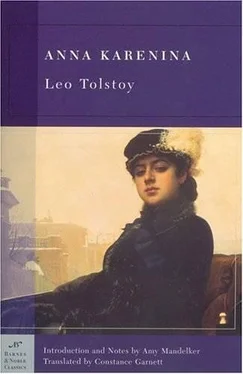Leo Tolstoy - Anna Karenina
Здесь есть возможность читать онлайн «Leo Tolstoy - Anna Karenina» весь текст электронной книги совершенно бесплатно (целиком полную версию без сокращений). В некоторых случаях можно слушать аудио, скачать через торрент в формате fb2 и присутствует краткое содержание. Жанр: Классическая проза, на английском языке. Описание произведения, (предисловие) а так же отзывы посетителей доступны на портале библиотеки ЛибКат.
- Название:Anna Karenina
- Автор:
- Жанр:
- Год:неизвестен
- ISBN:нет данных
- Рейтинг книги:4 / 5. Голосов: 1
-
Избранное:Добавить в избранное
- Отзывы:
-
Ваша оценка:
- 80
- 1
- 2
- 3
- 4
- 5
Anna Karenina: краткое содержание, описание и аннотация
Предлагаем к чтению аннотацию, описание, краткое содержание или предисловие (зависит от того, что написал сам автор книги «Anna Karenina»). Если вы не нашли необходимую информацию о книге — напишите в комментариях, мы постараемся отыскать её.
Anna Karenina — читать онлайн бесплатно полную книгу (весь текст) целиком
Ниже представлен текст книги, разбитый по страницам. Система сохранения места последней прочитанной страницы, позволяет с удобством читать онлайн бесплатно книгу «Anna Karenina», без необходимости каждый раз заново искать на чём Вы остановились. Поставьте закладку, и сможете в любой момент перейти на страницу, на которой закончили чтение.
Интервал:
Закладка:
"Yes, I will arrange it," she decided, and going back to her former thoughts, she remembered that some spiritual question of importance had been interrupted, and she began to recall what. "Yes, Kostia, an unbeliever," she thought again with a smile.
"Well, an unbeliever then! Better let him always be one than like Madame Stahl, or what I tried to be in those days abroad. No, he won't ever sham anything."
And a recent instance of his goodness rose vividly to her mind. A fortnight ago a penitent letter had come from Stepan Arkadyevich to Dolly. He besought her to save his honor, to sell her estate to pay his debts. Dolly was in despair, she detested her husband, despised him, pitied him, resolved on a separation, resolved to refuse, but ended by agreeing to sell part of her property. After that, with an irrepressible smile of tenderness, Kitty recalled her husband's shamefaced embarrassment, his repeated awkward efforts to approach the subject, and how at last, having thought of the one means of helping Dolly without wounding her pride, he had suggested to Kitty- what had not occurred to her before- that she should give up her share of the property.
"He an unbeliever indeed! With his heart, his dread of offending anyone, even a child! Everything for others, nothing for himself. Sergei Ivanovich simply considers it as Kostia's duty to be his bailiff. And it's the same with his sister. Now Dolly and her children are under his guardianship; all these peasants who come to him every day, as though he were bound to be at their service."
"Yes, only be like your father- only like him," she said, handing Mitia over to the nurse, and putting her lips to his cheek.
VIII
Ever since, by his beloved brother's deathbed, Levin had first glanced into the questions of life and death in the light of these new convictions, as he called them, which had during the period from his twentieth to his thirty-fourth year imperceptibly replaced his childish and youthful beliefs- he had been stricken with horror, not so much of death, as of life, without any knowledge of whence, and why, and how, and what it was. The physical organization, its decay, the Indestructibility of matter, the law of the conservation of energy, evolution, were the words which usurped the place of his old belief. These words and the ideas associated with them were very well for intellectual purposes. But for life they yielded nothing, and Levin felt suddenly like a man who has changed his warm fur cloak for a muslin garment, and going for the first time into the frost is immediately convinced, not by reason, but by his whole nature, that he is as good as naked, and that he must infallibly perish miserably.
From that moment, though he did not distinctly face it, and still went on living as before, Levin had never lost this sense of terror at his lack of knowledge.
He vaguely felt, too, that what he called his new convictions were not merely lack of knowledge, but that they were part of a whole order of ideas, in which no knowledge of what he needed was possible.
At first, marriage, with the new joys and duties bound up with it, had completely crowded out these thoughts. But of late, while he was staying in Moscow after his wife's confinement, with nothing to do, the question that clamored for solution had more and more often, more and more insistently, haunted Levin's mind.
The question was summed up for him thus: "If I do not accept the answers Christianity gives to the problems of my life, what answers do I accept?" And in the whole arsenal of his convictions, so far from finding any satisfactory answers, he was utterly unable to find anything at all like an answer.
He was in the position of a man seeking food in toyshops and firearm shops.
Instinctively, unconsciously, with every book, with every conversation, with every man he met, he was on the lookout for light on these questions and their solution.
What puzzled and distracted him above everything was that the majority of men of his age and circle had, like him, exchanged their old beliefs for the same new convictions, and yet saw nothing to lament in this, and were perfectly satisfied and serene. So that, apart from the principal question, Levin was tortured by other questions too: were these people sincere? or were they playing a part? or was it that they understood the answers science gave to these problems in some different, clearer sense than he did? And he assiduously studied both these men's opinions and the books which treated of these scientific explanations.
One fact he had found out since these questions had engrossed his mind- that he had been quite wrong in supposing, from the recollections of the university circle of his young days, that religion had outlived its day, and that it was now practically nonexistent. All the people nearest to him who were good in their lives were believers. The old Prince, and Lvov, whom he liked so much, and Sergei Ivanovich; and all the women believed; and his wife believed as simply as he had believed in his earliest childhood; and ninety-nine hundredths of the Russian people, all the people for whose life he felt the deepest respect, believed.
Another fact of which he became convinced, after reading many books, was that the men who shared his views had no other construction to put on them, and that they gave no explanation of the questions which he felt he could not live without answering, but simply ignored their existence and attempted to explain other questions of no possible interest to him, such as the evolution of organisms, the mechanistic theory of the soul, etc.
Moreover, during his wife's confinement, something had happened that seemed extraordinary to him. He, an unbeliever, had fallen into praying, and at the moment he prayed, he believed. But that moment had passed, and he could not make his state of mind at that moment fit into the rest of his life.
He could not admit that at that moment he knew the truth, and that now he was wrong; for as soon as he began thinking calmly about it, it all fell to pieces. He could not admit that he was mistaken then, for his spiritual condition then was precious to him, and to admit that it was a proof of weakness would have been to desecrate those moments. He was miserably divided against himself, and strained all his spiritual forces to the utmost to escape from this condition.
IX
These doubts fretted and harassed him, growing weaker or stronger from time to time, but never leaving him. He read and thought, and the more he read and the more he thought, the further he felt from the aim he was pursuing.
Of late in Moscow and in the country, since he had become convinced that he would find no solution in the materialists, he had read and reread thoroughly Plato, Spinoza, Kant, Schelling, Hegel, and Schopenhauer- those philosophers who gave a nonmaterialistic explanation of life.
Their ideas seemed to him fruitful when he was reading or was himself seeking arguments to refute other theories, especially those of the materialists; but as soon as he began to read or sought for himself a solution of problems, the same thing always happened. As long as he followed the fixed definition of vague words such as spirit, will, freedom, substance, purposely letting himself go into the snare of words the philosophers, or he himself, set for him, he seemed to comprehend something. But he had only to forget the artificial train of reasoning, and to turn from life itself to what had satisfied him while thinking in accordance with the fixed definitions, and all this artificial edifice fell to pieces at once like a house of cards, and it became clear that the edifice had been built up out of those transposed words, apart from a something in life that was more important than reason.
At one time, reading Schopenhauer, he put in place of his will the word love, and for a couple of days this new philosophy consoled him, till he removed away from it. But then, when he turned from life itself to glance at it again, it fell away too, and proved to be the same muslin garment with no warmth in it.
Читать дальшеИнтервал:
Закладка:
Похожие книги на «Anna Karenina»
Представляем Вашему вниманию похожие книги на «Anna Karenina» списком для выбора. Мы отобрали схожую по названию и смыслу литературу в надежде предоставить читателям больше вариантов отыскать новые, интересные, ещё непрочитанные произведения.
Обсуждение, отзывы о книге «Anna Karenina» и просто собственные мнения читателей. Оставьте ваши комментарии, напишите, что Вы думаете о произведении, его смысле или главных героях. Укажите что конкретно понравилось, а что нет, и почему Вы так считаете.












